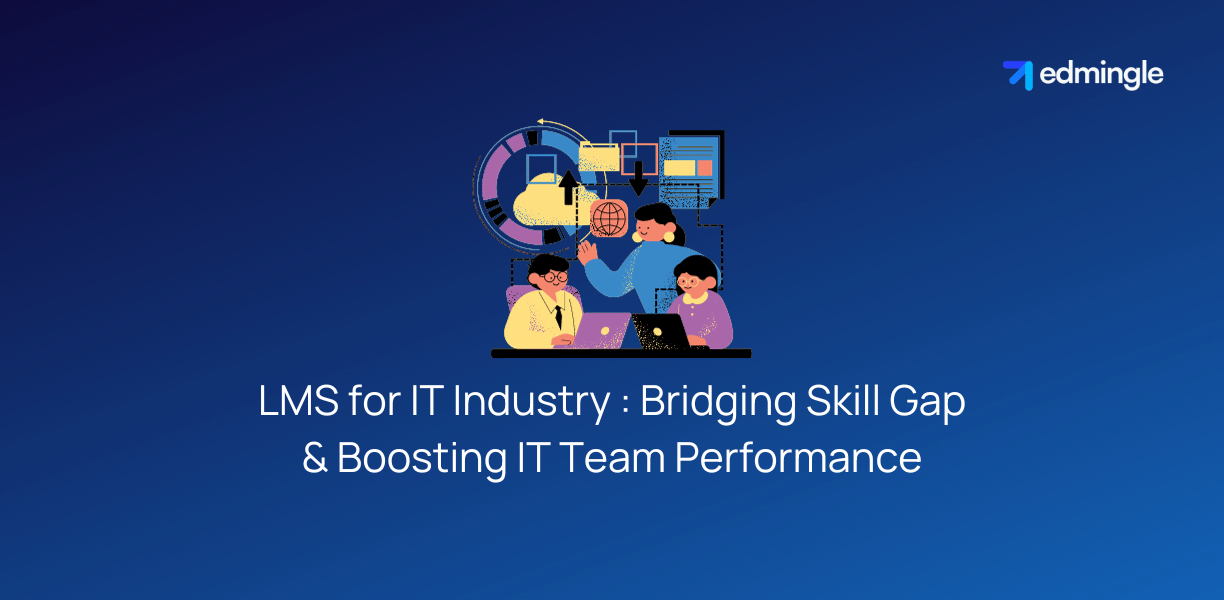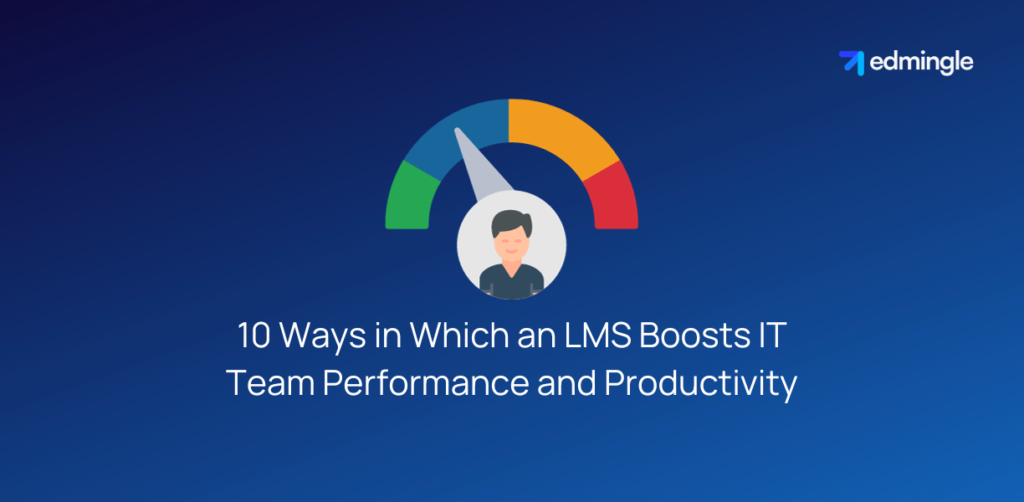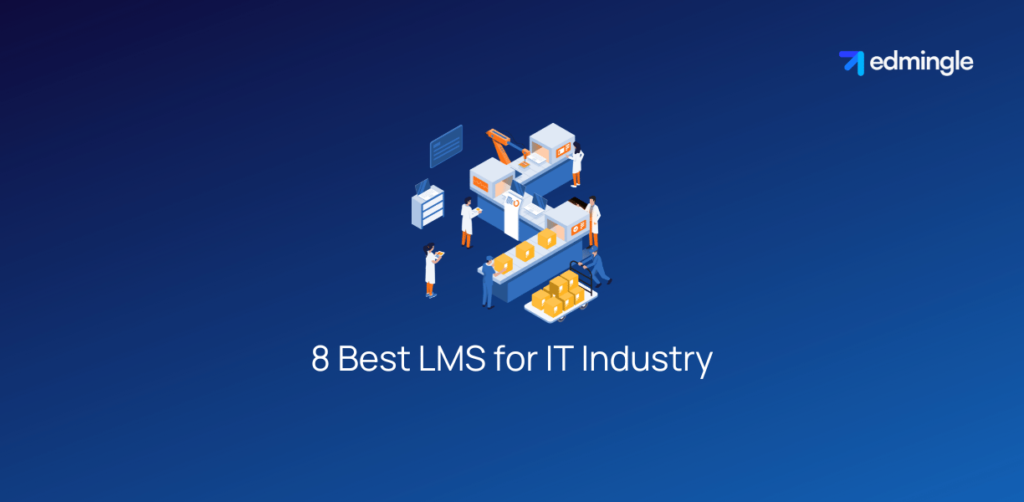
Modern technologies evolve at the speed of thought. And, staying ahead in the IT industry is all about upskilling everyday.
As IT professionals & leaders struggle with the challenge of equipping their teams with the latest skills and knowledge, an LMS for IT Industry becomes more than just a tool.
It bridges the ever-widening skill gap and elevates team performances to new heights.
But why is this so crucial now?
In this blog, we’ll dive into the heart of how an LMS fills the critical skill gaps in the IT education industry while revolutionizing team performance.
What is an LMS for IT Industry?
The IT landscape is rapidly changing, and traditional training methods are struggling to keep up.
And in such a scenario, learning management systems bring in a dynamic, flexible, and innovative solution tailored for the unique demands of the IT sector.
An LMS for IT industry is a specialized platform designed to facilitate the delivery, tracking & management of centralized learning/training programs within the information technology sector.
Why Does the Information Technology Industry Need An LMS?

The IT industry, known for its fast-paced and ever-evolving nature, necessitates a continual learning and upskilling environment for its workforce.
LMSs (Learning Management Systems) are crucial in this context as they provides a structured and efficient platform for continuous learning and professional development.
With technology trends and tools constantly changing, an LMS enables IT professionals in technology companies to stay updated with the latest skills and knowledge.
- It offers flexible, accessible, and tailored learning experiences, crucial for accommodating the diverse and specialized skill sets required in the IT field.
- Moreover, it facilitates certification and compliance training, ensuring that employees meet industry standards and regulations.
This continuous learning approach is vital for maintaining competitive advantage, fostering innovation, and ensuring the long-term success of IT organizations in a rapidly advancing technological landscape.
7 Key Features of an LMS for IT Industry

These type of learning management systems are tailored to meet the unique needs of IT professionals & organizations. The specific key features include:
- Technical Course Content: It includes a wide range of course materials focused on IT subjects. For example, software development, cybersecurity, data management, and network administration.
- Skill Tracking and Certification: The LMS can track the progress of learners in acquiring specific IT skills. And then provide certifications upon course completion. This is crucial for professional development in the IT field.
- Interactive Learning Tools: Given the technical nature of IT training, these LMS platforms often feature interactive tools. These may include coding simulators, virtual labs, interactive coding exercises and more.
- Customizable Learning Paths: IT professionals often require tailored learning paths to develop specific skill sets. An LMS for IT industry allows for the customization of learning modules to suit individual/organizational goals.
- Collaboration and Networking: They often include discussion forums, chatrooms, and collaboration tools to facilitate networking and information exchange among IT professionals. Even a tech savvy industry needs social learning for effective knowledge retention.
- Up-to-Date Content: The IT industry is rapidly evolving, so the LMS must regularly update its content to reflect the latest learning technologies, tools, and best practices.
- Scalability: As IT organizations grow, the LMS should be able to scale to accommodate more users, more courses, and more data without losing performance.
This kind of LMS is essential for IT companies focused on keeping their workforce skilled. It helps them ensure that their employees are proficient, certified & up-to-date in their respective domains.
How Does an LMS Bridge Skill Gap in the IT Industry?
An LMS (Learning Management System) plays a pivotal role in bridging the skill gap in the IT industry.
By providing a comprehensive and dynamic platform for continuous learning and skill development, it addresses this crucial need in the following manner:
| Tailored Learning Content | An LMS can host a wide range of IT-specific courses, from machine learning to advanced technology like cloud computing, Artificial Intelligence, and cybersecurity. This allows IT professionals to access the latest learning content that’s relevant to their field and current industry demands. |
| Personalized Learning Paths | IT professionals often have unique learning needs based on their current skill levels and career goals. An LMS allows the creation of personalized learning paths that target specific skill gaps, enabling learners to focus on areas where they need improvement. |
| Interactive and Hands-On Learning | Many LMS platforms for IT include interactive elements like simulations, virtual labs, and coding exercises. These tools provide hands-on experience and practical application, which are essential for mastering technical skills. |
| Tracking and Analytics | LMS platforms come equipped with tracking and analytics tools. These features help both learners and managers monitor employee progress, identify areas where learners are struggling, and adjust learning paths accordingly. |
| Continuous Learning Culture | In the fast-evolving IT sector, continuous learning is crucial. An LMS supports a culture of continuous learning and development by providing easy access to the latest courses and educational materials, encouraging IT professionals to keep their skills up-to-date. |
| Certification and Compliance Training | Many IT roles require specific certifications or compliance with industry standards. An LMS can offer certification courses and keep track of compliance training, ensuring that all team members meet the necessary criteria. |
| Accessibility and Flexibility | An LMS allows IT professionals to learn at their own pace and on their own schedule, which is crucial in a field where work hours can be irregular and demanding. |
| Collaboration and Knowledge Sharing | Advanced LMS platforms provide tools for collaboration and knowledge sharing among peers, fostering a community learning environment where IT professionals can learn from each other’s educational experiences and expertise. |
By leveraging these capabilities, an LMS effectively bridges the skill gap in the IT industry, ensuring that IT professionals have the necessary skills and knowledge to adapt to new technologies and meet the challenges of their roles.
10 Ways in Which an LMS Boosts IT Team Performance and Productivity

Based on the two previous sections, we can conclude that while an LMS bridges the skill gaps of IT employees, it also works towards boosting the entire team’s performance & productivity.
Employee training is a crucial aspect in any industry. Especially for the growth of that particular industry or businesses associated with it.
Learning management systems significantly boost IT team performance and productivity in ways like:
- It provides employees with up-to-date skills and knowledge.
- It allows for the creation of personalized learning paths to enhance team efficiency and effectiveness in their roles.
- It enables flexible learning schedules to reduce interference with core work activities.
- It improves job performance by providing hands-on learner experience through simulations.
- It fosters a culture of knowledge sharing and collaborative learning to encourage teamwork and innovation.
- An LMS helps identify areas where team members might need additional training by tracking and measuring learner progress. Thereby, ensuring continuous improvement in performance.
- Since it’s online training, costs related to physical training sessions are reduced to allow more resources to be devoted to core activities.
- An LMS ensures consistent training and standardization for maintaining quality and uniformity in the learning process and practices across the IT team.
- For IT roles that require certification or adherence to industry standards, an LMS can provide certifications and compliance training.
- An LMS for IT Industry increases employee engagement and satisfaction. When employees witness that the organization is investing in upskilling them, turnover rates are lowered and the industry gets a more committed workforce.
Since we talked about reduction of costs in this section, you’ll be thrilled to know that Edmingle can help reduce your operational costs by 20%.
In essence, an LMS serves as a powerful tool in enhancing the overall performance and productivity of IT teams by providing timely, relevant, and flexible learning opportunities aligned with both individual and organizational goals.
10 Benefits of an LMS for IT & Software Companies
The unique benefits that an LMS (Learning Management System) brings to IT and software companies are mentioned as follows:
| 1. Rapid Onboarding | An LMS streamlines the onboarding process for new IT and software professionals. By providing immediate access to training modules and company-specific processes, new hires can become productive more quickly, reducing the time to contribute effectively to projects. |
| 2. Cross-Training Opportunities | IT and software fields often require cross-disciplinary knowledge. An LMS facilitates cross-training in various domains like project management, UX design, or data analysis, enhancing the versatility and adaptability of the workforce. |
| 3. Coding Standards and Best Practices | An LMS can host training content on company-specific coding standards, software development methodologies, and best practices, ensuring uniformity in work quality and adherence to organizational norms. |
| 4. Soft Skills Development | Besides technical skills, soft skills like communication, teamwork, and problem-solving are crucial in IT and software companies. An LMS can provide modules to enhance these skills, leading to better collaboration and innovation. |
| 5. Custom Tool Training | IT and software companies often use custom tools or proprietary software. An LMS can host specialized training for these tools, ensuring that all employees are proficient in using them, leading to increased efficiency and better utilization of internal resources. |
| 6. Agile and Scrum Training | As many IT and software companies adopt Agile and Scrum methodologies, an LMS can provide ongoing training and refreshers in these areas to ensure that teams are aligned with these practices. |
| 7. Remote Work Enablement | Given the prevalence of remote work in the IT sector, an LMS facilitates the continuous training and development of remote employees, ensuring they remain integrated and up-to-date with company practices and technologies. |
| 8. Crisis Management and Cybersecurity Training | IT and software companies face unique challenges like data breaches or system failures. An LMS can provide specialized training in crisis management and cybersecurity, equipping employees to handle such situations effectively. |
| 9. Client-Specific Training | For companies working with diverse clients, an LMS can offer customer training modules to familiarize teams with client environments, technologies, and expectations, leading to better client service and project success. |
| 10. Innovation and Research | An LMS can facilitate online courses and materials focused on the latest research, trends, and innovations in the IT and software sector, encouraging continuous learning and keeping the company at the forefront of technological advancements. |
By leveraging these benefits, an LMS not only enhances the technical and professional skills of employees in IT and software companies but also contributes significantly to the operational efficiency, client satisfaction, and innovative capacity of the organization.
8 Best LMS for IT Industry & Software Companies

The IT industry is dynamic and ever-evolving. And, finding the best LMS (Learning Management System) is pivotal for fostering a culture of continuous learning and innovation.
Let’s have a look on the 8 best LMSs for the IT Industry in 2023:
1. Edmingle
Edmingle is a scalable & flexible LMS Platform. It’s a cloud-based LMS & highly useful for the dynamic needs of the IT industry. It offers a unique blend of features in its Learning Management System (LMS). It stands out with its highly interactive tools, Mettl integration & an improved customer experience.
It’s user-friendly interface appeals to a range of users, while supporting mobile learning. It also has robust tracking and analytics, allowing IT professionals to monitor their progress and focus on specific areas of improvement.
With its commitment to ease of management and scalability, Edmingle serves as a reliable and efficient LMS solution, well-suited to the fast-paced and constantly evolving IT sector. It’s been featured as the best LMS of 2023 by SoftwareSuggest.
2. Abara LMS
Abara LMS, designed for the IT industry, offers a robust and intuitive platform that facilitates efficient training and skill development. It features a comprehensive course library, customizable learning paths, and advanced analytics, making it ideal for dynamic IT learning needs.
3. AcademyOcean
Academy Ocean is an effective LMS for the IT industry, known for its engaging microlearning approach and personalized training paths. It caters well to continuous learning needs, offering analytics and automation to enhance the learning experience.
4. Mykademy LMS
Mykademy LMS offers a versatile and user-friendly platform ideal for the IT industry, featuring customizable course creation, real-time tracking, and interactive tools to enhance the learning experience for tech professionals.
5. TalentLMS
TalentLMS provides a flexible and scalable solution for the IT industry, featuring an intuitive design, comprehensive course options, and robust reporting tools, ideal for efficiently managing and delivering diverse IT training/learning programs.
6. ExpertusONE LMS
ExpertusONE LMS caters to the IT industry with a modern, user-centric approach, offering advanced integration capabilities, mobile learning support, and powerful analytics, making it suitable for delivering sophisticated and effective IT training programs.
7. Docebo
Docebo stands out in the IT industry as an LMS with its AI-driven platform, offering personalized learning experiences, extensive integrations, and an intuitive interface, making it ideal for scalable and effective IT training and development initiatives.
8. SeekLMS
SeekLMS offers a comprehensive and flexible solution for the IT industry, featuring an intuitive interface, extensive customization options, and robust analytics, making it well-suited for delivering effective and engaging IT training/learning programs.
Companies should look for an LMS that not only meets all the criteria mentioned above. But one that also aligns with their specific organizational goals and training requirements. This would ensure an optimal fit for their unique IT learning and development needs.
Conclusion
The IT industry’s diverse & evolving training needs demand specialized learning management systems capable of delivering tailored, efficient, and engaging learning experiences.
These e-learning solutions are the future of education and upskilling in nearly every domain & industry.
And ultimately, the right LMS is a strategic asset, empowering IT professionals and companies to stay at the forefront of innovation and industry demands.
FAQs on LMS for IT Industry
What makes an LMS suitable for the IT industry?
An LMS for the IT industry should offer a wide range of technical courses, support personalized learning paths, and include interactive tools like coding simulators. It should also be scalable, provide up-to-date content, and feature strong security measures to protect sensitive information.
How does an LMS help in addressing the skill gap in IT professionals?
An LMS helps bridge the skill gap by providing access to the latest training in emerging technologies and methodologies. It allows for personalized learning experiences, enabling IT professionals to focus on specific areas of improvement and stay current with industry advancements.
Can an LMS support different learning styles and preferences in the IT industry?
Yes, modern LMS platforms are designed to cater to various learning styles by offering a mix of textual, video, interactive, and hands-on learning modules. This versatility ensures that every IT professional can find a learning method that works best for them.
What are the benefits of using an LMS for remote IT teams?
For remote IT teams, an LMS offers flexible and accessible training, enabling team members to learn from any location and at any time. It facilitates consistent training across geographically dispersed teams and supports collaboration and communication through built-in tools.
How does an LMS enhance the onboarding process for IT companies?
An LMS streamlines the onboarding process by providing new hires with easy access to essential training materials and company-specific procedures. This accelerates the time it takes for new employees to become productive and integrates them more effectively into the team.






Leave a Reply